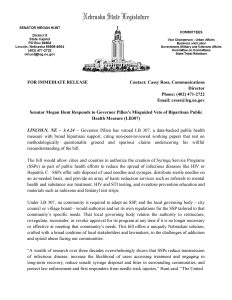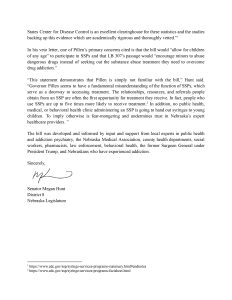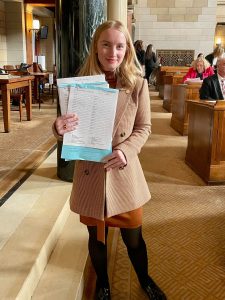NEBRASKA LEGISLATURE
The official site of the Nebraska Unicameral Legislature

Sen. Megan Hunt
District 8
The content of these pages is developed and maintained by, and is the sole responsibility of, the individual senator's office and may not reflect the views of the Nebraska Legislature. Questions and comments about the content should be directed to the senator's office at mhunt@leg.ne.gov
March 14th, 2024
In 2023, the Heart Ministry Center interviewed 29 individuals who had been denied SNAP benefits due to a drug-related felony on their records. A sample of those interviews can be viewed here: https://youtu.be/Vfq_Q8HONjI?si=cAHTdQvluGXvlJ5C. 28 of the 29 interviewed had completed a drug treatment program but were still denied access to SNAP benefits.
“At the Center, we serve over 125,000 community members in our food pantry annually. The Center’s food distribution program is a “choice” food pantry, which means community members can choose what they want to eat. This allows clients to be treated with more dignity and respect while reducing waste. The Center’s food distribution program is the largest food pantry in Nebraska, and in 2023 the program distributed over 3.8 million pounds of food. The Center offers SNAP enrollment assistance as a part of our food distribution service and many are accessing this service because they do not qualify for SNAP due to their criminal records.”
— Heart Ministry Center
Under current statute, an individual with a conviction for drug distribution or with three or more felony convictions for possession or use of controlled substances is ineligible to receive SNAP benefits for the rest of their life. LB 88 would allow these individuals to become eligible for SNAP once they have either completed their sentence or they are serving a term of parole, probation, or post-release supervision.
This ban is selectively moralistic, and incongruent when we consider that it doesn’t apply for any other type of crime. It’s cruel and willfully ignorant to say that our prison systems are intended to be rehabilitative, and for us to then send these folks back out into the world and continue punishing them by denying them access to assistance in meeting one of their most fundamental needs.
This bill has been brought many times, and I will continue to bring it until it is passed or until my time in this body is over.
When people are re-entering society after time in a correctional facility, their first and most basic human need is food. For many, it takes time to get established with housing, a career, and to start rebuilding a productive life. None of that can happen for a person that is going hungry.
Dear friends and neighbors,
Despite the broad bipartisan support and the bill’s data-backed approach, today Governor Pillen has vetoed my priority bill, LB 307. In response, I want to express my disappointment and reiterate the importance of this public health measure for Nebraska prior to the Legislature taking up a veto override in the coming days.
Governor Pillen’s veto statement about my priority bill demonstrates that he is simply not familiar with the bill. He has a fundamental misunderstanding of the function of Syringe Service Programs (SSPs), which serve as a doorway to accessing treatment. The relationships, resources, and referrals people obtain from an SSP are often the first opportunity for treatment they receive. In fact, people who use SSPs are up to five times more likely to receive treatment. In addition, no public health, medical, or behavioral health clinic administering an SSP is going to hand out syringes to young children. To imply otherwise is fear-mongering and undermines trust in Nebraska’s expert healthcare providers.
The bill was developed and informed by input and support from local experts in public health and addiction psychiatry, the Nebraska Medical Association, county health departments, social workers, pharmacists, law enforcement, behavioral health, the former Surgeon General under President Trump, and Nebraskans who have experienced addiction. I have no doubt that we will successfully override this veto and make great strides toward our shared goals of increasing public health and safety through LB 307.
Below you can read my press release in response to Governor Pillen’s veto.
I appreciate your ongoing support and engagement on matters vital to our community’s well-being. Stay tuned for updates on LB 307 and other initiatives aimed at building a healthier Nebraska.
All the best,
Meg


January 4th, 2024
Dear friends and neighbors,
As we step into this new legislative session, I am filled with hope and determination to enact positive change for our community. Our unwavering focus remains on championing bills that promote equity, ensure housing stability, and remove discriminatory barriers. Together, our collective efforts will ensure our state thrives by uplifting every individual and family.
Yesterday I prioritized LB307, which would empower local jurisdictions to authorize public health programs to distribute hypodermic needles as part of public health efforts to reduce the spread of infectious diseases such as HIV and Hepatitis C.
I also introduced two bills to protect students facing eviction during the school year (LB845) and to reduce the prevalence of bed bugs and evictions (LB846). Today, I introduced LB913, a bill to extend postpartum care to all women and people who need it.
This year, my primary focus is continuing the work on bills I introduced last year, which carry over into this new session. You can view the full list of bills I have introduced since last session here. These bills encapsulate our shared vision for a better state.
I’m looking forward to a legislative session that prioritizes things that improve the lives of all Nebraskans like workforce, housing, and attracting and retaining talent, rather than targeting groups that are already marginalized or struggling. Let’s use these 59 days to do good.
All the best,
Meg
Priority Bill – LB307
As I mentioned, I am designating LB307 as my personal priority bill for this year. It was my priority bill last year but was not scheduled for debate. It remains on General File and is in a good position to see early debate with bipartisan support this year.
LB 307 would allow local jurisdictions to authorize public or behavioral health programs to distribute hypodermic needles as part of public health efforts to reduce the spread of infectious diseases such as HIV and Hepatitis C. Such programs are known as Syringe Service Programs (SSPs). SSPs protect the public and first responders by facilitating the safe use and disposal of syringes; curbing outbreaks of disease; and encouraging intravenous drug users facing addiction to access treatment.
Nebraska’s HIV infection rate has shown an alarming trend in the years since the pandemic: 2021 saw the highest number of new infections in more than a decade, a figure largely driven by an uptick in rural counties’ infection rates. As fentanyl prices drop and more of the drug is trafficked, fentanyl overdose incidents are on the rise. 214 Nebraskans died of overdose in 2021. SSPs can help address each of these issues by providing comprehensive services such as fentanyl test strips, overdose prevention education, and referrals to substance abuse treatment programs. SSPs are proven to reduce the incidence of HIV, hepatitis C, and other bloodborne diseases by as much as 50%, and SSP participants are five times more likely to enter treatment and engage in long-term recovery than users who do not use an SSP.
Under current Nebraska law, a local jurisdiction that wishes to authorize an SSP is prohibited from doing so by the Uniform Controlled Substances Act. With LB 307, the legislature could grant localities a powerful tool to exercise local control and the discretion to meet their community’s needs as they see fit. In a rural community, there might not be any good option for a brick-and-mortar location that could house an SSP. In those places, the community could implement the program through their local pharmacy, or do something more innovative like a mobile service unit. With LB 307 we leave that up to the local jurisdiction, who can set the parameters for their particular program. The bill does not require any locality to adopt such a program.
The Committee Amendment (AM381) was suggested by expert physicians with the Nebraska Medical Association, who encouraged us to provide some legal protection for program participants. If an intravenous drug user is trying to do the right thing by using more safely through an SSP and potentially seeking resources to help overcome their addiction, we do not want to criminalize them. AM 381 shields users from criminal liability related to their use of SSP services, which could be a major deterrent to anyone who would otherwise want to use an SSP. There is no cost to the state associated with LB 307. When we consider that the average lifetime cost of treating a person living with HIV is somewhere around $420,000, this is a preventive measure that can provide significant cost savings to the State. Additionally, there may be funding available to fund SSPs through the federal Substance Abuse and Mental Health Service Administration (SAMHSA) or the Opioid Settlement Fund.
This bill came out of committee with 7 yes votes, not a single no vote, and has bipartisan support from the Douglas County Sheriff, Nebraska Medical Association, The R Street Institute (a conservative, free-market think tank), the Nebraska AIDS Project, Centerpointe, the Nebraska Association of Behavioral Health Organizations, and OutNebraska. My office is working to solidify official support from public health directors, the UNMC College of Public Health, NACO, and the League of Municipalities in advance of the debate.
District 8 Events
Christmas Tree Disposal
- Sites close on Jan. 9th
- Click here for a full list of locations and requirements
- Jan. 5th, starting at 5pm
Folk House Concerts at the Castle
- Jan. 12th at Joslyn Castle Carriage House
- Jan. 13th at Culxr House at 7pm (tickets $20)
Gender Fluids by Big Canvas Comedy
- Jan. 19th at Blackstone Theater at 8:30pm (tickets $10)
- Comics from across the gender spectrum showcase their comedy skills
- St. Cecilia Cathedral on Jan. 26th, 27th, and 28th
- July 27th and 28th
Our Office in the News
Omaha World-Herald – Nebraska Legislature kicks off 2024 with multiple workforce development bills
KETV Omaha – 2024 means $12 minimum wage in Nebraska, but no change for tipped employees
News Channel Nebraska – No shortage of critics for Pillen’s suggested sales tax hike
Lincoln Journal Star – Ernie Chambers, others plead for Pillen to accept summer food aid for Nebraska children
KETV Omaha – Nebraska Legislature focused on property tax relief, and workforce solutions in 2024
Lincoln Journal Star – League of Women Voters of Nebraska files amicus brief in Planned Parenthood case
Sen. Megan Hunt
P.O. Box 94604
Lincoln, NE 68509
(402) 471-2722
Email: mhunt@leg.ne.gov
- Column (47)
- District Info (4)
- Events (6)
- Opinion (2)
- Press Releases (24)
- Uncategorized (7)
- Welcome (1)
You are currently browsing the District 08 Blog blog archives for the year 2024.
-
Business and Labor
Committee On Committees
Government
Military and Veterans Affairs
Urban Affairs
State-Tribal Relations

Streaming video provided by Nebraska Public Media